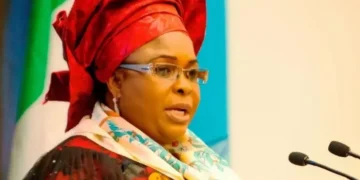By Beatrice Gondyi, Bauchi
In the rhythm of city life, one essential facility remains conspicuously overlooked—the public toilet. These unassuming spaces are more than mere conveniences; they are vital to public health, safety, and human dignity.
Public toilets are indispensable. Young and old alike rely on them, scattered across urban centres for accessibility. From crowded markets to tranquil parks, they serve as a lifeline—and a telling indicator of a city’s commitment to sanitation and inclusivity. Yet, they remain neglected in public health discourse.
A recent investigations by SPEAR NEWS have uncovered a disturbing reality: many of these essential facilities across Bauchi exist in shocking states of disrepair.
For Mustapha Ibrahim one of the managers who runs Bababa plaza in Wunti Market, maintaining the toilets is a big challenge because of water shortage.
Ibrahim who spoke in hausa said keeping the toilets clean is difficult as water is very necessary
“one of our major challenge is lack of water. During dry season, the wells dry up and we had to walk long distances or pay garuwa (water vendors) to get water.”
Another Manager, Rabiu Abubakar, who runs one the toilet facilities in the multipurpose indoor sports hall, his challenge is with those who will use the facilities and not pay.” people patronise us well. My problem is that psome don’t pay the token while others don’t clean up after using the toilets.
For Nasir Abubakar “we are doing the job as expected we clean and maintain hygiene standards. People patronise but the challenge we have is always water. To bath with Hot water we charge 200 while 150 for cold water. To urinate is 20 naira and defecation is 100, but women and phy challenged is free.
Abdulhadi Mohd honestly water is a major issue since the flyover construction biz is slow peope don’t pay, maintaining is difficult we have to augment with dryclean services. We call on government to put more effort and maintain as well construct more public toilets. Public toilets can never be enough, there is need for more toilets especially for women who can’t urinate everywhere and also for visitors and tourists coming to the city for the first time.
A few of the facilities however are in impeccable condition with modern facilities. Despite being a fundamental human need, access to clean and safe public toilets remains uneven across urban and rural areas.
In many cities around the world, the number of functioning toilets is far below recommended levels. Overcrowding, poor maintenance, and safety concerns plague those that do exist. Women, elderly individuals, people with disabilities, and the homeless are disproportionately affected.
In Bauchi State RUWASA and BASEPA and relevant stakeholders, has led to the construction of thousands of public toilets, some managed by local men and women there by creating both jobs and cleaner cities. One of the toilets built with support from RUWASA, Women use it without paying.
“Access to a toilet isn’t just about convenience — it’s about dignity,” says Adamu Baba. He further decried the rate of open defecation because people don’t want to pay for using the toilets.
Rabiu Abubakar also, call on government to renovate the existing facilities and construct new ones to create jobs
Speaking recently in a training for pit Emptiers, the Director General BASEPA, Dr. Mahmud Bose said that the training was conducted in order to ensure that the participants abide by the pit emptying practices in order to prevent disease transmission such as diarrhoea, typhoid and cholera as well as protect ground and surface water quality and environment.
According to him, Pit emptying is the process of removing accumulated faecal sludge from pit latrines and septic tanks and is performed using either manual or mechanical method.
“Globally, an estimated 1.6 million deaths including children are recorded annually due to faecal contamination and over 100,000 deaths of under 5 children in Nigeria.About 1.8 billion people globally are estimated to use a source of drinking water that is faecally contaminated”
“Annually, the total cost of unsafely managed human excrete are estimated at US $260 billion globally and around N455 billion(1.3%GDP) in Nigeria” he said
A Call for Better Policy
There is need for better policies to address this “Public toilets must be viewed as critical infrastructure, not just roads or water lines,” says Malam Haruna, a public analyst.
The Way Forward
These conveniences are grossly inadequate to meet the needs of users. I Bauchi State, with a population of over 5 million people, the public toilets in use by the citizens is nothing write home about.
As cities grow denser and more diverse, public toilets will play an even greater role in supporting healthy, inclusive urban life. Whether it’s ensuring hygiene during a pandemic or giving a street vendor a dignified option, toilets are not just facilities — they are a reflection of a society’s priorities. Government must prioritise the construction of these facilities will enhance the implementation of the Sustainable Development Goals which is, Clean Water and Sanitation. Public toilets play a crucial role in providing access to sanitation and hygiene.
Good Health and Well-being. Properly maintained public toilets can help prevent the spread of diseases.
Sustainable Cities and Communities. Well-designed public toilets can contribute to making cities more livable and sustainable.









































Discussion about this post